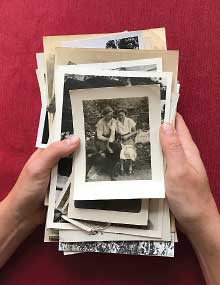A family history of psychiatric disorders, especially bipolar disorder, is an important risk factor for postpartum psychiatric disorder, according to a population-based cohort study published May 7 in AJP in Advance.
Co-authors Anna E. Bauer, Ph.D., and Samantha Meltzer-Brody, M.D., said that questions related to female and male first-degree relatives with bipolar disorder are of the highest importance and should be added to routine clinical screening guidelines to improve prediction of postpartum risk among pregnant women.
Bauer is a postdoctoral research associate in the Department of Psychiatry at the University of North Carolina (UNC) at Chapel Hill School of Medicine. Meltzer-Brody is director of the perinatal psychiatry program at the UNC Center for Women’s Mood Disorders. Their colleagues included researchers at the National Center for Register-Based Research at Aarhus University in Denmark and other international institutions.
The researchers analyzed Danish birth and psychiatric treatment registers to evaluate familial risk of postpartum psychiatric episodes in a national population-based cohort. The primary exposure was a diagnosed psychiatric disorder in a relative.
The final population-based cohort consisted of 362,462 mothers who gave birth to their first child in Denmark between 1985 and 2012. The mean age of mothers was 27.0 years at time of delivery. Of these mothers, 2,603 (0.7 percent) experienced a psychiatric disorder within six months postpartum and 4,085 (1.1 percent) within 12 months postpartum.
Overall, the risk of experiencing a psychiatric disorder within the first six months postpartum was higher among mothers with a first-degree relative who had experienced any psychiatric disorder compared with those whose relatives had not experienced any psychiatric disorder. The risk of experiencing a postpartum psychiatric episode was highest when mothers had a first-degree relative with bipolar disorder. Familial risk was also elevated for those who had a first-degree relative with schizophrenia, unipolar disorder, or other mood disorder.
The authors also found associations of family history of psychiatric disorders to be stronger among women without a personal psychiatric history, indicating that family history may be particularly helpful in a risk-assessment tool for new-onset postpartum psychiatric episodes among women with no record of psychiatric disorders.
“Previously, a woman who has a brother with bipolar disorder but no personal history of mental illness would not necessarily be identified as being at higher risk for experiencing a postpartum psychiatric disorder,” they wrote. “However, this research provides evidence that such characteristics may identify novel risk groups to which clinicians could direct additional screening efforts, earlier education about symptoms, or earlier referral to mental health resources.”
Clinical practice guidelines in the United States have recently been updated to reflect a growing emphasis on the importance of perinatal mental health screening, but the current guidelines of the U.S. Preventive Services Task Force and the American College of Obstetricians and Gynecologists do not include family history as a risk consideration for postpartum psychiatric disorders.
“Predicting who will experience a postpartum psychiatric disorder is a challenge but also of great importance,” the authors noted. “The results of this study provide compelling evidence that assessment of risk for postpartum psychiatric illness, with a particular focus on history of bipolar disorder, should include inquiring about family history of psychiatric disorders in any male or female first-degree relative.” ■
“Familiality of Psychiatric Disorders and Risk of Postpartum Psychiatric Episodes: A Population-Based Cohort Study” can be accessed
here.

